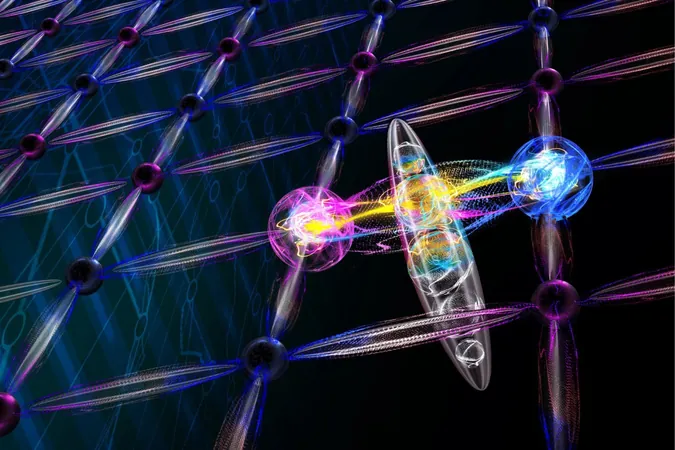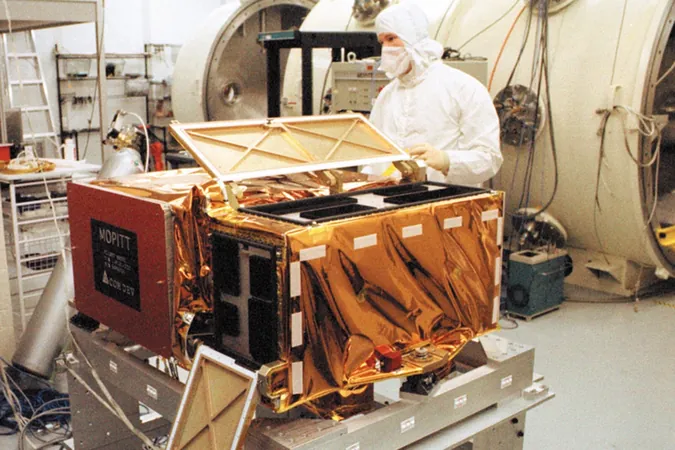
The Revolutionary Qudit: What You Need to Know About Its Impact on Quantum Computing
2025-04-01
Author: Michael
Introduction
Quantum computing is the forefront of modern technology, with qubits being the backbone of this fascinating field. But there's a new player on the scene: the qudit, a computational unit that could redefine the realms of quantum information processing.
Understanding Qudits
While qubits operate like bits in classical computers—taking the values of 0 or 1—qudits go a step further by incorporating multiple states. This multi-level approach allows qudits to perform complex operations far beyond the capabilities of traditional computing methods.
Insights from Christine Muschik
In a recent enlightening discussion with Christine Muschik, a prominent researcher at the Perimeter Institute and the University of Waterloo, we explored the implications of this groundbreaking technology.
Recent Research
Muschik's team has made significant strides, recently publishing research in Nature Physics. This paper marks a substantial advancement in quantum simulations, particularly concerning gauge theories—an area that pertains to fundamental interactions in physics.
The Advantage of Qudits
The potential of using qudits, instead of sticking with the conventional two-state qubit paradigm, opens up numerous avenues for research and technological application.
Expanding Information Capacity
Intriguingly, as we transition from qubits to qudits, there are exponentially greater information-carrying capabilities available in the quantum realm.
For instance, while a qubit can represent a binary decision—a simple yes or no—a qutrit, the next step in the qudit family, allows for an additional option—maybe.
Challenges Ahead
Muschik emphasizes that while encoding more information is beneficial, the challenge lies in managing increased complexity efficiently without losing fidelity.
The First Complete Qudit Algorithm
One of the most exciting outcomes from Muschik's collaboration is the development of the first complete qudit algorithm, which has been likened to “putting your circuit on a diet.” By streamlining operations, qudits can overcome the intrinsic noise that plagues quantum computations, enabling faster and more accurate results.
Applications of Qudits
Applications of qudits are vast, extending beyond particle physics to fields like materials science and chemistry.
These multi-state systems are also poised to play a significant role in the development of a secure quantum internet, enhancing encryption methods crucial for data protection in our increasingly digital world.
A Vision for the Future
Muschik’s vision for the future of qudits is ambitious. She envisions them being integral in experiments at organizations like CERN, where high-energy particle collisions are critical for understanding the universe's fundamental forces.
Integration with Qubits
The integration of qudits into quantum computing does not preclude the use of qubits. Instead, Muschik highlights a synergy between the two, suggesting that both can be employed according to their strengths.
Looking Ahead
Looking ahead, Muschik and her team are focused on overcoming existing challenges related to error mitigation and optimal control within quantum systems utilizing qudits.
Conclusion
As we stand on the brink of a quantum revolution, the qudit represents one of the most promising advancements in a field that continues to reshape our understanding of technology and the universe. Keep an eye on this rapidly evolving story; the future of quantum computing may very well depend on it!









 Brasil (PT)
Brasil (PT)
 Canada (EN)
Canada (EN)
 Chile (ES)
Chile (ES)
 Česko (CS)
Česko (CS)
 대한민국 (KO)
대한민국 (KO)
 España (ES)
España (ES)
 France (FR)
France (FR)
 Hong Kong (EN)
Hong Kong (EN)
 Italia (IT)
Italia (IT)
 日本 (JA)
日本 (JA)
 Magyarország (HU)
Magyarország (HU)
 Norge (NO)
Norge (NO)
 Polska (PL)
Polska (PL)
 Schweiz (DE)
Schweiz (DE)
 Singapore (EN)
Singapore (EN)
 Sverige (SV)
Sverige (SV)
 Suomi (FI)
Suomi (FI)
 Türkiye (TR)
Türkiye (TR)
 الإمارات العربية المتحدة (AR)
الإمارات العربية المتحدة (AR)